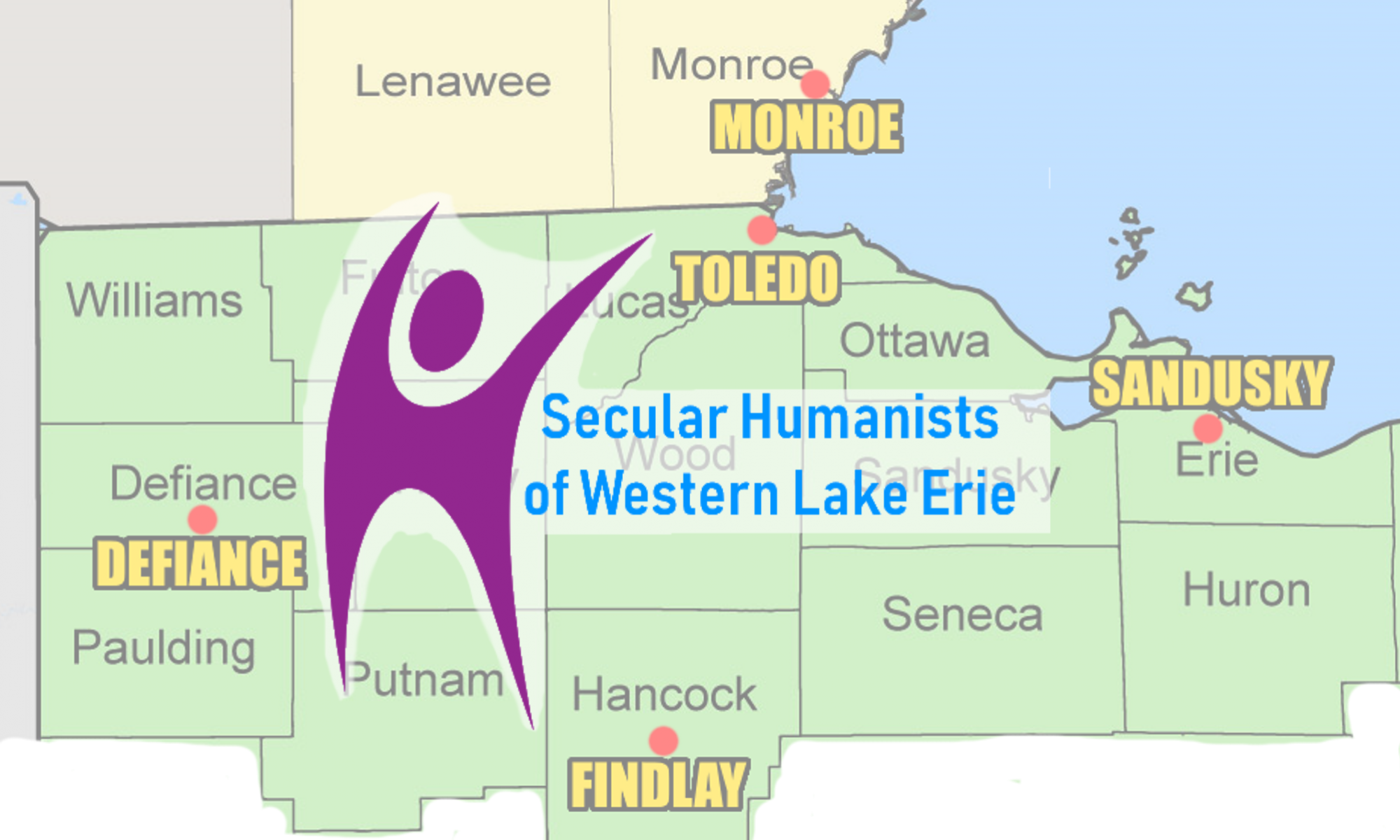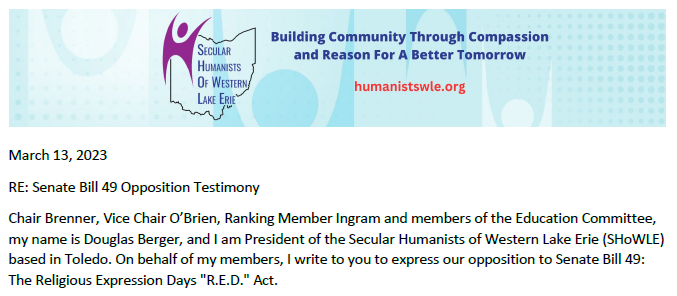This session, the Ohio Senate introduced Senate Bill 49 also known as The Religious Expression Days “R.E.D.” Act. If passed it would give religious students in public schools three days off each year for religious reasons. SHoWLE opposes this bill for the main reason is it gives special privileges to religious students. We also don’t believe a law is needed since many school districts currently make accommodations for religious observances.
SHoWLE President Douglas Berger submitted written testimony to the Ohio Senate Education committee. Here is the text of his remarks:
March 13, 2023
RE: Senate Bill 49 Opposition Testimony
Chair Brenner, Vice Chair O’Brien, Ranking Member Ingram and members of the Education Committee, my name is Douglas Berger, and I am President of the Secular Humanists of Western Lake Erie (SHoWLE) based in Toledo. On behalf of my members, I write to you to express our opposition to Senate Bill 49: The Religious Expression Days “R.E.D.” Act.
We believe that the bill is well intentioned, and we believe that it is seen as being “fair” and “just” to students who have religious beliefs and who may have been treated differently by their public schools when it comes to having an excused absence to observe a religious holiday or observance. However, we believe this proposed law is NOT equitable to all students since it excludes the non-religious. It could unduly burden the religious by requiring them to register with the school district to be allowed to practice their religion. It also creates an unfunded mandate on already strapped public school districts and based on current legal precedents Senate Bill 49 is simply not needed as a state law.
The 1st amendment of the US Constitution ensures governmental neutrality in matters of religion. US Supreme Court Justice William O. Douglas wrote in 1961:
The “establishment” clause protects citizens also against any law which selects any religious custom, practice, or ritual, puts the force of government behind it, and fines, imprisons, or otherwise penalizes a person for not observing it. The Government plainly could not join forces with one religious group and decree a universal and symbolic circumcision. Nor could it require all children to be baptized or give tax exemptions only to those whose children were baptized.
The state cannot enact a law, for example, that says public school students cannot be excused for any religious holidays or observances. That would violate the 1st Amendment and would look hypocritical since most schools are closed on Christmas and Easter. Why then should a proposed law that forces school districts to give special consideration only to students who are religious be proper or needed?
According to some estimates, there are roughly 4,200 religions, churches, denominations, religious bodies, faith groups, tribes, cultures, movements, ultimate concerns, which at some point in the future will be countless.
We are familiar with the big ones like Christianity, Judaism, and Islam but there are also hundreds more like Paganism, Buddhism, Hinduism, Jainism, Sikhism, Confucianism, Shinto, Taoism, Bahai Faith, many Greek Catholic Churches, Eastern Orthodox Church, Oriental Orthodox Churches, Unitarianism, Gnosticism, Unification Church, Druze, Shia Islam, Sunni Islam, Sufism, Kabbalah, Orthodox Judaism, Humanistic Judaism, Wicca, Mongolian shamanism, Adat Pu’un, Malaysian folk religion, Hawaiian religion, Sino-Tibetan, African Zionism, Black Hebrew Israelites, Deism, and Zoroastrianism.
Then we get to Africa and find Bantu, Louisiana Voodoo, Santeria, and in America we find lots more Native American religions like Alaska Native religion, Ojibwe spirituality, Cherokee folk religion, Aztec religion, Maya religion, and so on….
My point is that based on the current language of Senate Bill 49, there would be a serious issue trying to accommodate all those religious beliefs. There are only 180 days on a school calendar. The created observance calendars would have no room for anything else but observances, feast days, and high holydays.
Last legislative session, a similar bill was passed that applied to colleges and universities. In one of the news articles about that bill, someone commented about the same problem of too many religions and not enough days available.
It would be natural to limit what observances are accommodated but a state law would not be able to limit what could be observed. We also wonder why the text of Senate Bill 49 sets the number of days allowed at such an arbitrary number. The bill’s sponsor offered no reason for choosing 3 days.
We are also troubled by the section of the bill applying to teachers. Is it the intent of this legislature to make it harder to staff public schools by allowing teachers to take up to 3 days off each year and not putting any guardrails up like you did requiring students to request the days off at the beginning of the year? Most if not all teacher contracts have days off they can take if needed but they have to get it approved in advance because that classroom time has to be covered. This legislature is also considering bills including Senate Bill 11 that is in this committee now, that would remove millions of dollars from public school budgets. How will a district struggling under the weight of more budget cuts pay to cover for a teacher to be absent for a religious observance?
This brings me to our strongest objection to this bill. It excludes the non-religious. What if my 7th grader wanted to take a day off to observe Charles Darwin’s Birthday? According to the language of this bill and the intent of the sponsors it only protects students who have religious beliefs.
A proponent of this bill claimed that non-religious public school students have an advantage over students who are religious. They offered no proof or example. I checked with some of the districts near me and found by and large they all have absence policies that allow for time off for religious observances and I know from my own personal experience it was not unusual to see a lot of foreheads with ash crosses on Ash Wednesday in my public high school.
Another proponent said that their religion could lead to an absence of 13 days for the death of a parent. I find it hard to believe any public school district would not make accommodations for that situation.
I could not find any concrete examples beyond anecdotal evidence that districts are systematically discriminating against students who want time off for religious observances.
Religion in public schools is one of the most regulated and litigated areas of government. There have been countless court cases that helped correct violations of the 1st amendment by school officials and districts. This law isn’t needed because if someone is discriminated in a public school due to religion there are existing processes in place to correct that. Parents have tremendous power to have their child excused for religious reasons and schools will make accommodations to make up work or tests if the child doesn’t abuse that accommodation.
I sympathize with students who feel they have to choose between school and their religion, but public school is not a private religious school. Students have to make compromises when attending a public school like attending five days a week, or sometimes having to attend on a particular religious observance day. Students who feel they cannot make that compromise can already ask for accommodation for an observance or they can attend a private school that caters to their religious beliefs while giving them an education.
The 1st amendment prohibits the government from establishing a religion and court cases over the years say that the government should not show favoritism for one sect or many sects and that the right of the non-religious also needs to be protected. The government should remain neutral in religious matters. That is why the language of this bill makes a point to stress “a classroom teacher must accept without question the sincerity of a student’s religious or spiritual belief system and keep alternative accommodation requests confidential” because to do anything else opens the school up to a lawsuit. So we know that is a concern of the outside group who offered the text of the bill and it is a concern for us too.
While I am heartened to read the written proponent testimony from a variety of religious groups that they support religious freedom, I should point out that religious freedom also means freedom from religion. If a law will burden a religious belief or the non-religious, then the state needs a compelling secular reason for doing so and we feel Senate Bill 49 doesn’t meet that level.
To me and my members, who are not religious, we see the language of the bill giving a benefit to the religious that the non-religious will not be allowed to have 3 additional personal days off. How is that not going against the 1st amendment?
If you want to “protect” a student’s religious expression days, why not amend this bill, and make it truly secular in intent by removing all the language about religion and religious beliefs and substitute “for reasons of conscience”.

